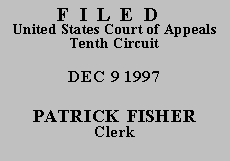

| UNITED STATES OF
AMERICA,
v. RALPH E. BAILEY, |
No. 97-5047
(D.C. No. 94-CR-66-B) |
Under 18 U.S.C. § 3231, "[t]he district courts of the United States shall have original jurisdiction ... of all offenses against the laws of the United States." Coupled with Article I, Section 8, of the Constitution and the Sixteenth Amendment, these codifications surely embrace the statute forming the basis of Mr. Bailey's probation revocation. See United States v. Collins, 920 F.2d 619, 629 (10th Cir. 1990). Not only does Mr. Bailey offer no authority for his "territorial jurisdiction" argument but also its weary refrain has been silenced by numerous courts suffering the same din. Id.
Secondly, in contrast to the Gun-Free School Zone Act which the Court found in Lopez exceeded Congress' Commerce Clause authority,(1) none of the sources authorizing the collection of income taxes, Article I, Section 2, Clause 3; Article I, Section 8, Clause 1; and Article I, Section 9, Clause 4, of the Constitution restrict the Congress' power to tax only income derived from interstate commerce. The Sixteenth Amendment removes certain restrictions on Congress' taxing power found in Article I, Section 2, Clause 3, and Article I, Section 9, Clause 4, addressing the need for apportionment among the states. Congress may impose taxes on individuals in the states "without apportionment among the several States, and without regard to any census or enumeration" and "on income, from whatever source derived." (emphasis added). This last clause governs the sources from which the income tax may be assessed while "among the several states" only clarifies that Congress does not need to apportion such tax among the states based on their number or any census or enumeration. See Peck v. Lowe, 247 U.S. 165 (1918). Thus, it is not a restrictive grant permitting the tax to be imposed only where the individual received income from interstate commerce but is a broad grant of power to tax income from whatever source derived, including income from wholly intrastate actions or property. Mr. Bailey's additional arguments §§ 7202 and 7212(a) "are not commercial in nature and cannot be regulated under the Commerce Clause" are tautological constructions incapable of rational resolution.
AFFIRMED.
ENTERED FOR THE COURT
John C. Porfilio
Circuit Judge
*. This order and judgment is not binding precedent, except under the doctrines of law of the case, res judicata, and collateral estoppel. This court generally disfavors the citation of orders and judgments; nevertheless, an order and judgment may be cited under the terms and conditions of 10th Cir. R. 36.3.
1.Contrary to Mr. Bailey's assertion, Lopez did not question whether "Congress' commerce authority is Constitutional." United States v. Lopez, 514 U.S. 549 (1995).